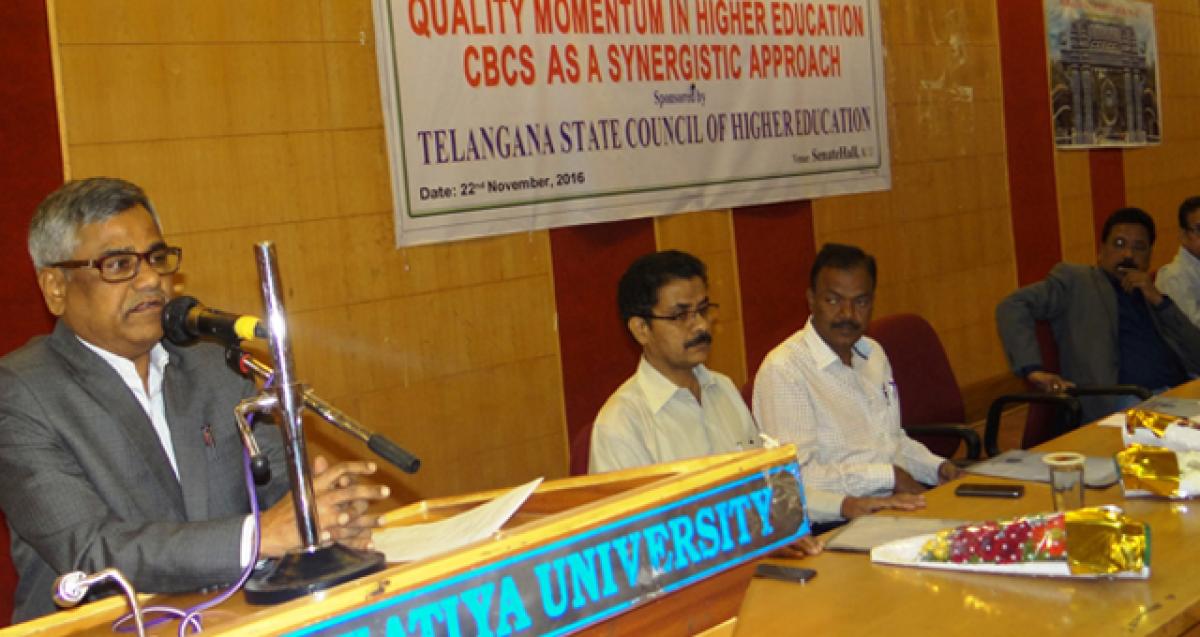Live
- Zomato gets GST tax demand notice of Rs 803 crore
- Atul Subhash suicide: No arrests made yet, says Bengaluru Police Commissioner
- Indian agrochemicals sector to see 7-9 pc growth next fiscal: Report
- SC refers to CJI Cong leader’s petition for verification of EVMs used in Haryana polls
- To become the youngest world champion is truly a great feat: Gill congratulates Gukesh
- Case Filed Against Allu Arjun Under Four Sections
- Remembering A Visionary Leader.
- CREDAI Bengaluru seeks govt support for E-Khata issues
- Driverless Namma Metro nets revenue of `230 crore even before its launch
- Uber launches women-only bike rides in Bengaluru
Just In

In view of the benefits accruing to the students, the system must be implemented with dedication and commitment, he told the academic coordinators. He was addressing academic coordinators of the colleges at a one-day work shop on ‘Quality momentum in higher education-CBCS as a synergistic approach’.
Hanamkonda: The newly introduced ‘choice based credit system’ (CBCS) would improve employability of the students at global level, asserted Kakatiya University Vice-Chancellor Prof R Sayanna.
In view of the benefits accruing to the students, the system must be implemented with dedication and commitment, he told the academic coordinators. He was addressing academic coordinators of the colleges at a one-day work shop on ‘Quality momentum in higher education-CBCS as a synergistic approach’.
The workshop was held at Kakatiya University Senate Hall in Hanamkonda on Tuesday under the aegis of the KU Internal Quality Assurance Cell (IQAC) in association with Telangana State Council of Higher Education (TSCHE).
Students have the facility to move from one institution to another and the flexibility of greater choice of courses of their interest besides the core subjects. It was a transformation from traditional teacher centered to student centered education, Prof Sayanna explained.
The TSCHE Vice-Chairman Prof S Mallesham said that it was made mandatory to implement the CBCS in Telangana from the current academic year. The system creates choice for broad-based learner’s profile across areas of knowledge widening the intellectual insight.
The CBCS state committee member Prof M Chenna Basavaiah of Osmania University made a power point presentation on the topic. He said that CBCS was not new and being implemented in prestigious intuitions like, JNU, IIMs and IITs successfully.
The main objective of the system was to evolve a higher education system that suitably blended with provision for knowledge and skill practices where every student learns without sacrificing his or her creativity, he said.
It also aims to bring reforms in higher education so that students develop thinking as well as analytical ability. The students could equip themselves with necessary skills and ultimately become employable globally as the system allows inter-disciplinary study. Prof G V Chalam of Acharya Nagarjuna University delivered a talk on the topic in the afternoon.
The KU Controller of Examinations Prof K Purushotham, IQAC Director Prof P Krishnama Chary, CBCS Monitoring Committee Chairman Prof M Subrahmanya Sharma and Dean (academic audit) Prof T Ramesh addressed the gathering. Around 200 academic coordinators attended the workshop.

© 2024 Hyderabad Media House Limited/The Hans India. All rights reserved. Powered by hocalwire.com







